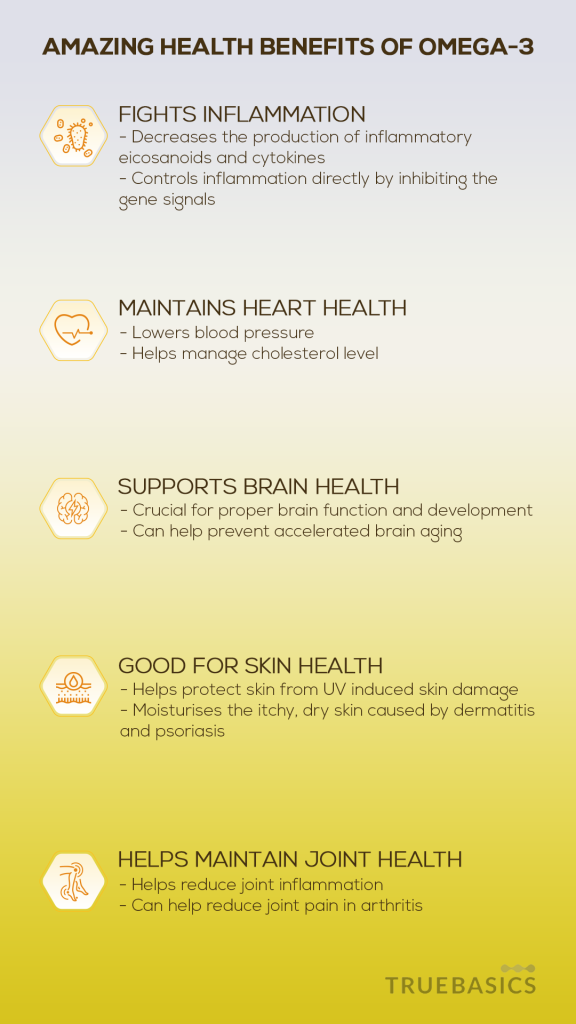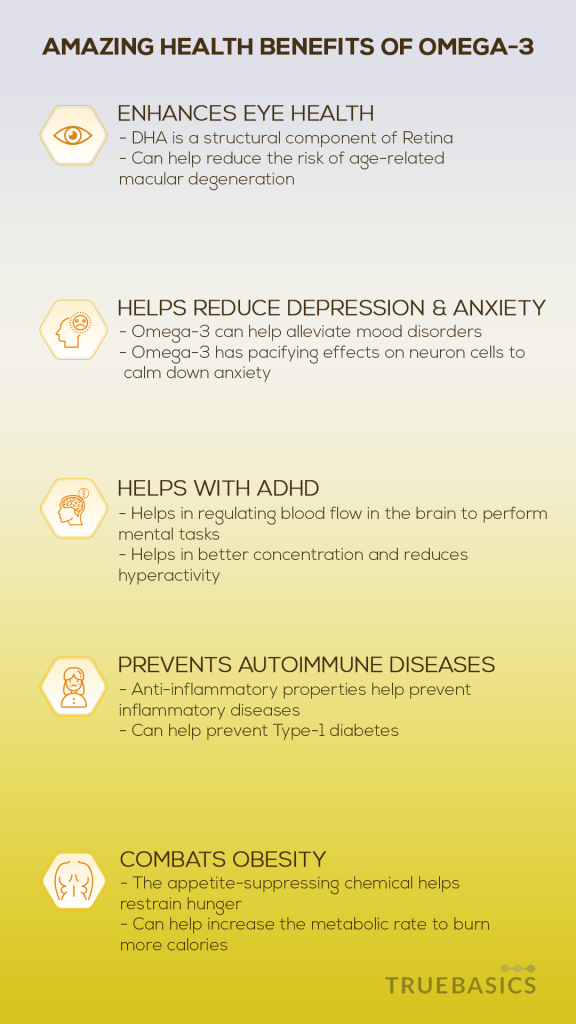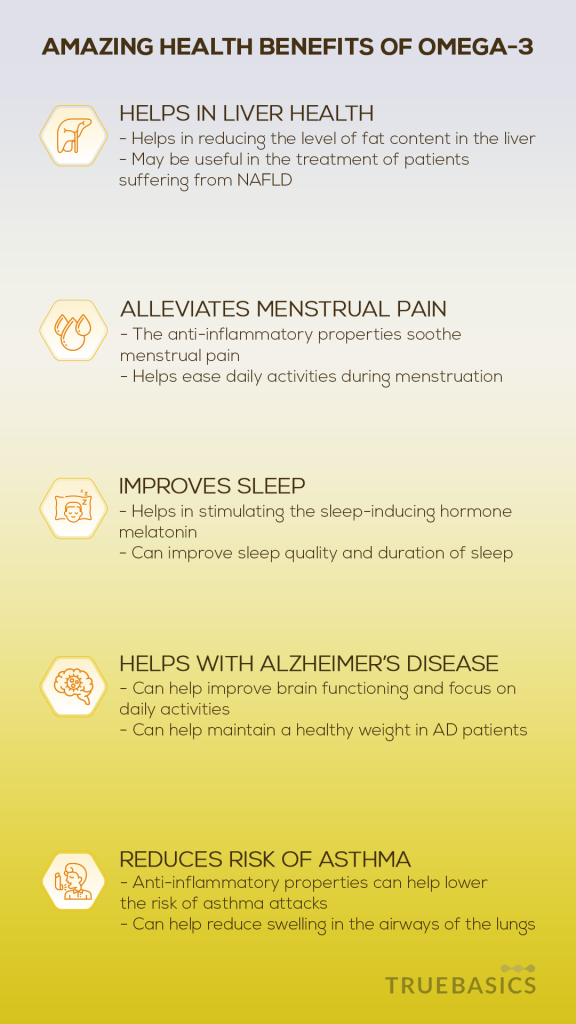Omega-3 fatty acids are a group of essential polyunsaturated fatty acids (PUFA). ALA (Alpha-linolenic acid), EPA (Eicosapentaenoic Acid), and DHA (Docosahexaenoic Acid) are the principal component of the Omega-3 group. Omega-3 fatty acids are called essential because your body can’t make them, and they can only be obtained through dietary sources [1] [2]. ALA is majorly found in plant sources while EPA and DHA are found mainly in algae and marine sources.
Benefits of Omega-3
Omega-3 fatty acids play important structural and functional roles in the body. Omega-3 is important for maintaining the health of your heart, eyes, brain, skin, and joint. They have anti-inflammatory properties and helps in blocking inflammation pathways inside the cell [3]. They also help in building cell membranes throughout the body. DHA is an integral component of your brain and eyes [4]. DHA is also known to play a vital role during pregnancy, as it is deemed essential for the healthy growth of the foetus [5].
Let’s dive right in to know how omega-3 can help you in maintaining your health and age gracefully:
1. Fights Inflammation
Inflammation is a defence mechanism by the body to protect you from infection and other injuries. It helps to restore homeostasis, the regulatory control system of metabolism and immunity and commences the killing of pathogens. When the body gets affected by any infection, this homeostatic regulation gets altered and causes harm to the body [6].
Omega-3 has anti-inflammatory properties. It decreases the production of inflammatory eicosanoids and cytokines. Omega-3 directly controls inflammation by replacing the base component of inflammatory arachidonic acid and therefore the inflammatory substance production. It also inhibits the gene signalling for inflammatory action thereby controlling inflammation indirectly. Studies have suggested a strong action of Omega-3 in settings like rheumatoid arthritis. However, Omega-3 has shown a weak correlation in the case of inflammatory action in bowel disease and asthma. Further research is required to gauge the effect of Omega-3 in these cases [7].
2. Maintains Heart Health
As we grow old, ageing, neglect of the right nutrition, a sedentary lifestyle starts taking a toll on our heart health. Obesity, smoking, drinking further exacerbates the problem and can lead to multiple cardiovascular diseases. The issues can manifest in the form of high blood pressure, high cholesterol, irregular heartbeat, and stroke.
Omega-3 can help maintain heart health by lowering the blood pressure and reducing the triglycerides levels in the blood. Omega-3 helps manage cholesterol levels by reducing the synthesis of “bad” LDL cholesterol and increase the levels of “good” HDL cholesterol [8]. Omega-3 can also prevent platelets in the blood from congregating together, which helps protect against blood clots [9]. Omega-3 also helps in regulating heartbeat and slow down plaque accumulation in the arteries [10].
3. Supports Brain Health
Omega-3 contains EPA and DHA which are crucial for proper brain functioning and development. DHA in Omega-3 also help slowdown cognitive decline due to aging. Intake of Omega-3 can help in maintaining the grey matter of brain and arrest the effects of ageing on brain [11].
The aging brain is also vulnerable to inflammatory and oxidative reactions which may cause a decline in learning and memory. DHA in Omega may help in improving memory and help in cell regeneration.
4. Good for Skin Health
The skin is the largest organ of the human body. It protects your body from infection, UV, pollution and several other external factors.
Omega-3 can help prevent multiple skin problems. A combination of EPA and DHA reduces skin sensitivity to UV rays [12] and helps combat UV induced inflammation in the skin. The presence of Omega-3 in the diet helps ensure the cell membranes of skin cells are healthy thereby keeping your skin soft, supple and wrinkle-free.
Taking an Omega-3 rich diet can also reduce the possibility of developing acne. It also helps in reducing inflammation and itchiness associated with acne [13]
Omega-3 is also known to moisturise the itchy, dry skin that is caused by dermatitis and psoriasis, both of which are severe skin conditions. It improves skin barrier function thereby sealing the moisture and removing the irritants [14] [15].
5. Helps Maintain Joint Health
Joints are often plagued by inflammation and resulting in joint pain. Omega-3 can help enhance joint health by reducing joint inflammation and joint stiffness. Joint pain is also common in the athletic population due to additional load from physical activity and heavy exercises. The population is also prone to articular cartilage damage. The joint pain is often caused by the secretion of cytokines and the insertion of inflammatory cells in the synovium.
Omega-3 inhibits the production of inflammatory cytokines relieving the joint pain symptoms. Studies have reported that Omega-3 intake can reduce joint stiffness and increase grip strength [16].

6. Enhances Eye Health
Omega-3, particularly DHA, is a major component involved in the structural formation of the retina of your eyes. Omega-3 also calms down the dryness and the inflammation linked to dry eyes. Lack of Omega-3 in the daily diet can increase the risk of developing certain vision problems like dry eyes, high eye pressure and glaucoma [17].
Omega-3 is also associated with reducing the risk of age-related macular degeneration, which is known to cause severe eye damage [18].
7. Helps Reduce Depression and Anxiety
Depression and anxiety are the most common mental disorders plaguing the country today. Losing interest in daily life, feeling lethargic and sad most of the time, are few of the common symptoms of depression [19]. Similarly, if you worry about general things a lot and often find yourself to be nervous, then you might be suffering from anxiety.
Regular omega-3 consumption can help in alleviating the mood disorders. Studies have indicated that people who had omega 3 fatty acids in their diet showed improved signs of depression [20]. EPA in omega-3, particularly, is known to fight depression. EPA applies an anti-inflammatory effect on the neuron cells on your body [21]
8. Helps with ADHD
Attention deficit hyperactivity disorder (ADHD) is a medical condition in which a person has differentiated brain activities that affect your ability to self-control, sit still and pay attention. ADHD generally happens to children at a young age, and in most cases, goes on even in adulthood.
Studies have shown a correlation between ADHD patients and lower levels of omega-3 fatty acids in their blood [22]. Omega-3, especially DHA, when taken regularly, helps in regulating constant blood flow while performing mental tasks [23]. This keeps the brain functioning properly and enables you to have greater control over your actions. A good amount of omega-3 can help you concentrate better and achieve task completion by reducing hyperactivity and restlessness [24].
9. Prevents Autoimmune Diseases
In autoimmune diseases, the body’s immune system mistakes the healthy cells of your body as alien cells and starts to attack them. Type 1 diabetes, lupus, Crohn’s disease, rheumatoid arthritis, etc. are few of the example of autoimmune diseases.
Omega-3 can help combat autoimmune diseases due to their anti-inflammatory properties. It helps in the management of autoimmune and inflammatory diseases [25] [26].
10. Combats obesity
Obesity is a condition wherein your body starts accumulating excess fat. This can result in problems like high stress on joints, bones, heart and can increase the risk of high blood pressure, diabetes and high cholesterol.
Omega-3 plays a crucial role in combating obesity as it can help in reducing your hunger. The appetite suppressing compounds in Omega-3 helps in restraining the feeling of hunger and thus avoiding overeating. Moreover, omega-3 is also known to increase the levels of serotonin, a brain chemical that curbs your cravings and makes you feel like your stomach is full. If you’re looking to lose weight, but often feel hungry, then you can include omega-3 in your regular diet. Studies have shown that people who consumed a significant amount of fish oil daily reported feeling fuller for longer hours after a meal [27].
Omega-3 also helps in increasing your metabolic rate, which means that you burn more calories and thus tend to lose excess fat [28]. Studies show that omega-3 might lead to an increase in the anabolic pathways of your skeletal muscle, which further leads to increased lean tissue mass and greater metabolic rate. Plus, after you exercise, omega-3 helps boost the effects of your workout as it helps your switch from using carbohydrates instead of fats to fuel your body while you exercise [29].

11. Helps in Liver Health
The liver is responsible for metabolizing fat, neutralizing toxins and store iron. Excess fat deposition due to excessive obesity can result in Non-Alcoholic Fatty Liver Disease (NAFLD) affecting the liver functioning.
Omega-3 can help in the metabolism of excess fat and reducing fat deposition in the liver. A research study showed that people who regularly consumed omega-3 through fish oil or as supplements saw a significant reduction in the level of fat content in their liver. Omega-3 can help the patients suffering from NAFLD (non-alcoholic fatty liver disease), a condition in which excessive fat starts to build-up in your liver, as it helps regulate liver functions by cutting down on their liver fat [30].
12. Alleviates Menstrual Pain
Menstrual pain occurs in women due to the contraction of the uterus caused by prostaglandins, the body chemicals that are involved in pain and inflammation. Omega-3, owing to its anti-inflammatory properties, can soothe menstrual pain by inhibiting the inflammation action [31]. Few studies have shown that women who suffered from dysmenorrhea, also known as painful menstrual cramps, took omega-3 supplements for three months and experienced reduced pain than the women who didn’t [32] [33].
13. Improves Sleep
While multiple factors like stress, anxiety, poor diet, can result in reduced sleep quality, lack of omega-3 in your diet could be one of the reasons that you might not be getting enough sleep. DHA helps in inducing sleep by stimulating melatonin, an important hormone that helps you sleep. When your body is low in omega-3 or DHA, it can also go low on melatonin and hence, you can experience trouble while sleeping.
Regular intake of Omega-3 can help improve sleep quality as well as sound sleep duration [34].
14. Helps with Alzheimer’s Disease
Alzheimer’s is generally a result of aging, in which your brain cells and cell connections degenerate and die by themselves, causing memory loss and disrupted mental functioning.
Omega-3, mainly DHA, can help Alzheimer’s patients by aiding in the proper functioning of the nervous system. DHA is present in the neuron membrane phospholipids of the nervous system. Some studies have shown that consumption of omega-3 daily can lead to improved brain functioning, a better focus of daily activities, and thus decreased chances of Alzheimer’s disease [35]. Omega-3 fatty acids have also proven beneficial for AD patients who suffer from weight loss by helping them in maintaining a healthy weight [36].
15. Reduces Risk of Asthma
Asthma is a severe lung condition in which your breathing becomes difficult, you feel short of breath and experience serious coughing and wheezing. When there’s severe inflammation and swelling in the air passage of your lungs, it may even cause you to experience a critical asthma attack.
Anti-inflammatory properties of Omega-3 have been shown to be effective against lowering the risk of asthma [37].

So, how much Omega-3 should you take?
There is no recommended dietary allowance set by the Indian Council of Medical Research. However, experts recommend a minimum of 1000 mg/day of Omega-3 which can go up to 2000 mg/day.
Top sources of omega-3 fatty acids
Animal sources: Fatty-oily fishes such as Mackerel, Salmon, Cod Liver, Herring, Sardines, Anchovies, Tuna, and oysters
Plant-based sources: Flaxseed, walnuts, chia seeds, soybeans
If your daily diet is lacking the requisite amount of Omega-3, then you might consider taking Omega-3 supplements suited to your needs and lifestyle preferences.
In Conclusion…
Omega-3 offers multiple health benefits like maintaining heart, brain, joints, skin, eye health and combating inhibiting inflammation. They can be included from easily accessible dietary sources like fatty fishes, seeds, dairy products. If you’re looking to adopt a healthful and nourishing lifestyle, make sure to take in the right amount of omega-3 daily, either via food sources or via supplements.
Sources:
[1] https://www.ncbi.nlm.nih.gov/pubmed/25339684
[2] https://www.ncbi.nlm.nih.gov/pmc/articles/PMC4537707/
[3] https://www.ncbi.nlm.nih.gov/pmc/articles/PMC2174995/
[4] https://www.ncbi.nlm.nih.gov/pubmed/20478353
[5] https://www.ncbi.nlm.nih.gov/pmc/articles/PMC2621042/
[6] https://www.ncbi.nlm.nih.gov/pmc/articles/PMC4439431/
[7] https://academic.oup.com/ajcn/article/83/6/1505S/4633275
[8] https://www.ncbi.nlm.nih.gov/pubmed/18774613
[9] https://www.ncbi.nlm.nih.gov/pubmed/11997274
[10] https://medlineplus.gov/ency/patientinstructions/000767.htm
[11] https://www.ncbi.nlm.nih.gov/pmc/articles/PMC4772061/
[12] https://www.ncbi.nlm.nih.gov/pubmed/21569104
[13] https://www.ncbi.nlm.nih.gov/pmc/articles/PMC3780801/
[14] https://www.ncbi.nlm.nih.gov/pmc/articles/PMC3133503/
[15] https://www.ncbi.nlm.nih.gov/pubmed/22123240
[16] https://www.ncbi.nlm.nih.gov/pmc/articles/PMC6357022/
[17] https://www.ncbi.nlm.nih.gov/pubmed/15555528
[18] https://www.ncbi.nlm.nih.gov/pubmed/24557349
[19] https://www.sciencedirect.com/science/article/abs/pii/S0165178115003844
[20] https://www.ncbi.nlm.nih.gov/pmc/articles/PMC3976923/
[21] https://www.ncbi.nlm.nih.gov/pmc/articles/PMC6087692/
[22] https://www.ncbi.nlm.nih.gov/pubmed/21961774
[23] https://www.ncbi.nlm.nih.gov/pubmed/27217152
[24] https://www.ncbi.nlm.nih.gov/pubmed/21961774
[25] https://www.ncbi.nlm.nih.gov/pmc/articles/PMC4216999/
[26] https://www.researchgate.net/publication/10991730_Omega-3_Fatty_Acids_in_Inflammation_and_Autoimmune_Diseases
[27] https://www.ncbi.nlm.nih.gov/pubmed/18602429
[28] https://www.ncbi.nlm.nih.gov/pubmed/23317405
[29] https://www.ncbi.nlm.nih.gov/pmc/articles/PMC4682991/.
[30] https://www.uhs.nhs.uk/ClinicalResearchinSouthampton/Research/Facilities/NIHR-Southampton-Biomedical-Research-Centre/News-and-updates/Articles/Omega-3-helps-liver-disease-patients.aspx
[31] https://www.healthxchange.sg/food-nutrition/supplements/omega-three-reasons-women-need-it
[32] https://www.ncbi.nlm.nih.gov/pubmed/7588501
[33] https://www.ncbi.nlm.nih.gov/pubmed/8623866
[34] https://www.ncbi.nlm.nih.gov/pmc/articles/PMC4013386/
[35] https://www.ncbi.nlm.nih.gov/pubmed/19262590
[36] https://www.ncbi.nlm.nih.gov/pmc/articles/PMC3262608/
[37] https://www.ncbi.nlm.nih.gov/pmc/articles/PMC3827145/













